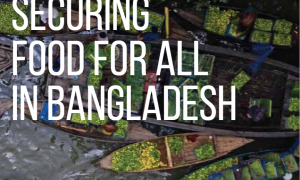Agricultural development projects increasingly aim to improve health and nutrition outcomes, often by engaging women.
Search
Connecting the dots to transform food systems in South Asia: TAFSSA’s engagement strategy
Home to one-quarter of humanity — one-fifth of whom are youth – South Asia has the world’s largest concentration of poverty and malnutrition.
Home to one-quarter of humanity—one-fifth of whom are youth—South Asia has the world’s largest concentration of poverty and malnutrition (1–3).
In 2005, India passed the National Rural Employment Guarantee Act (NREGA, “the Act”), a law guaranteeing all rural households 100 days of work at a minimum wage through the building of durable assets, which created one of the largest anti-poverty
Understanding the types of food systems interventions that foster women’s empowerment and the types of women that are able to benefit from different interventions is important for development policy.
Misallocation, selection, and productivity: A quantitative analysis with panel data from China
We use household‐level panel data from China and a quantitative framework to document the extent and consequences of factor misallocation in agriculture.
A growing body of evidence indicates that agricultural development programs can potentially improve production diversity and diet quality of poor rural households; however, less is known about which aspects of program design are effective in diver
In the first few months of the COVID-19 pandemic, researchers at IFPRI and elsewhere worked quickly with their partners in government, the private sector, and survey firms to provide evidence on the immediate impacts of the COVID-19 health crisis
In a pair of commentaries published in The Lancet in August 2020, we and our colleagues in the Standing Together for Nutrition Consortium (STfN) and the leaders of four UN agencies called for immediate action to address the escalating problems of
How to support students and the learning process during India’s COVID-19 school closures
The COVID-19 pandemic has affected 1.6 billion learners worldwide, and school closures could lead to a loss of 0.3–0.9 years of schooling, according to World Bank estimates; a global shutdown of five months could result in lost earnings of $10 tri
Public food transfer programs serve as an important safety net for those facing hunger and food insecurity in both low- and high-income countries around the world.
The COVID-19 pandemic has led to major disruptions in preventive health and nutrition services around the world, posing particular risks for vulnerable groups such as young children and pregnant women. Early estimates suggest that these disruption
Agricultural lands are vital to food security, which is imperative to the “no global hunger” objective of the United Nation’s Sustainable Development Goals.
The relationship between household gender attitudes and women’s poultry production: Evidence from Burkina Faso
Enhancing women’s participation in agricultural production, including livestock production, has the potential to generate a range of benefits for rural households in the developing world.
Gender in agriculture and food systems
Food is the most important basic need for sustenance and survival, and the right to food is among the fundamental human rights.
Securing Food for All in Bangladesh presents an array of research that collectively addresses four broad issues: (1) agricultural technology adoption; (2) input use and agricultural productivity; (3) food security and output markets; and (4) pover
Despite declining arable agricultural land, Bangladesh has made substantial progress in boosting domestic food production, improving access to food by increasing household income, and enhancing nutritional outcomes
Agricultural production in Bangladesh has undergone dramatic changes over the past several decades.

